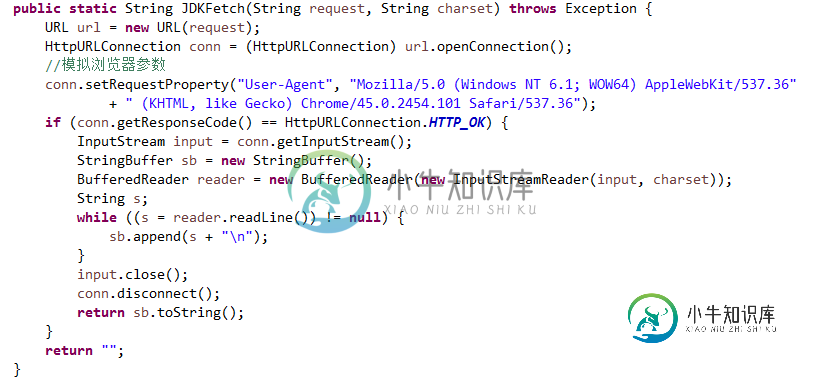详解Java实现多种方式的http数据抓取
前言:
时下互联网第一波的浪潮已消逝,随着而来的基于万千数据的物联网时代,因而数据成为企业的重要战略资源之一。基于数据抓取技术,本文介绍了java相关抓取工具,并附上demo源码供感兴趣的朋友测试!
1)JDK自带HTTP连接,获取页面或Json

2) JDK自带URL连接,获取页面或Json

3)HttpClient Get工具,获取页面或Json

4)commons-io工具,获取页面或Json

5) Jsoup工具(通常用于html字段解析),获取页面,非Json返回格式】

--------------------------------------------------------------------------------
完整代码:
package com.yeezhao.common.http;
import java.io.BufferedReader;
import java.io.InputStream;
import java.io.InputStreamReader;
import java.net.HttpURLConnection;
import java.net.URL;
import org.apache.commons.httpclient.HttpClient;
import org.apache.commons.httpclient.HttpMethod;
import org.apache.commons.httpclient.methods.GetMethod;
import org.apache.commons.io.IOUtils;
import org.jsoup.Jsoup;
/**
* http工具对比
*
* @author Administrator -> junhong
*
* 2016年12月27日
*/
public class HttpFetchUtil {
/**
* 获取访问的状态码
* @param request
* @return
* @throws Exception
*/
public static int getResponseCode(String request) throws Exception {
URL url = new URL(request);
HttpURLConnection conn = (HttpURLConnection) url.openConnection();
return conn.getResponseCode();
}
/**
* 1)JDK自带HTTP连接,获取页面或Json
* @param request
* @param charset
* @return
* @throws Exception
*/
public static String JDKFetch(String request, String charset) throws Exception {
URL url = new URL(request);
HttpURLConnection conn = (HttpURLConnection) url.openConnection();
//模拟浏览器参数
conn.setRequestProperty("User-Agent", "Mozilla/5.0 (Windows NT 6.1; WOW64) AppleWebKit/537.36"
+ " (KHTML, like Gecko) Chrome/45.0.2454.101 Safari/537.36");
if (conn.getResponseCode() == HttpURLConnection.HTTP_OK) {
InputStream input = conn.getInputStream();
StringBuffer sb = new StringBuffer();
BufferedReader reader = new BufferedReader(new InputStreamReader(input, charset));
String s;
while ((s = reader.readLine()) != null) {
sb.append(s + "\n");
}
input.close();
conn.disconnect();
return sb.toString();
}
return "";
}
/**
* 2) JDK自带URL连接,获取页面或Json
* @param request
* @param charset
* @return
* @throws Exception
*/
public static String URLFetch(String request, String charset) throws Exception {
URL url = new URL(request);
return IOUtils.toString(url.openStream());
}
/**
* 3)HttpClient Get工具,获取页面或Json
* @param url
* @param charset
* @return
* @throws Exception
*/
public static String httpClientFetch(String url, String charset) throws Exception {
// GET
HttpClient httpClient = new HttpClient();
httpClient.getParams().setContentCharset(charset);
HttpMethod method = new GetMethod(url);
httpClient.executeMethod(method);
return method.getResponseBodyAsString();
}
/**
* 4)commons-io工具,获取页面或Json
* @param url
* @param charset
* @return
* @throws Exception
*/
public static String commonsIOFetch(String url, String charset) throws Exception {
return IOUtils.toString(new URL(url), charset);
}
/**
* 5) Jsoup工具(通常用于html字段解析),获取页面,非Json返回格式
* @param url
* @return
* @throws Exception
*/
public static String jsoupFetch(String url) throws Exception {
return Jsoup.parse(new URL(url), 2 * 1000).html();
}
}
测试代码:
package com.yeezhao.common.http; import org.junit.After; import org.junit.Before; import org.junit.Test; /** * 测试类 * 3个测试链接: * 1)百科网页 * 2)浏览器模拟获取接口数据 * 3)获取普通接口数据 * @author Administrator -> junhong * * 2016年12月27日 */ public class HttpFetchUtilTest { String seeds[] = {"http://baike.baidu.com/view/1.htm","http://m.ximalaya.com/tracks/26096131.json","http://remyapi.yeezhao.com/api/query?wd=%E5%91%A8%E6%98%9F%E9%A9%B0%E7%9A%84%E7%94%B5%E5%BD%B1"}; final static String DEFAULT_CHARSET = "UTF-8"; @Before public void setUp() throws Exception { } @After public void tearDown() throws Exception { System.out.println("--- down ---"); } @Test public void testGetResponseCode() throws Exception{ for(String seed:seeds){ int responseCode = HttpFetchUtil.getResponseCode(seed); System.out.println("ret="+responseCode); } } @Test public void testJDKFetch() throws Exception{ for(String seed:seeds){ String ret = HttpFetchUtil.JDKFetch(seed, DEFAULT_CHARSET); System.out.println("ret="+ret); } } @Test public void testURLFetch() throws Exception{ for(String seed:seeds){ String ret = HttpFetchUtil.URLFetch(seed, DEFAULT_CHARSET); System.out.println("ret="+ret); } } @Test public void testHttpClientFetch()throws Exception { for(String seed:seeds){ String ret = HttpFetchUtil.httpClientFetch(seed, DEFAULT_CHARSET); System.out.println("ret="+ret); } } @Test public void testCommonsIOFetch()throws Exception { for(String seed:seeds){ String ret = HttpFetchUtil.commonsIOFetch(seed, DEFAULT_CHARSET); System.out.println("ret="+ret); } } @Test public void testJsoupFetch() throws Exception{ for(String seed:seeds){ String ret = HttpFetchUtil.jsoupFetch(seed); System.out.println("ret="+ret); } } }
附:相关jar依赖
... <dependency> <groupId>org.jsoup</groupId> <artifactId>jsoup</artifactId> <version>1.7.3</version> </dependency> <dependency> <groupId>commons-httpclient</groupId> <artifactId>commons-httpclient</artifactId> <version>3.1</version> </dependency> <dependency> <groupId>commons-io</groupId> <artifactId>commons-io</artifactId> <version>2.4</version> </dependency> ...
以上就是本文的全部内容,希望对大家的学习有所帮助,也希望大家多多支持小牛知识库。
-
本文向大家介绍详解ListView中多种item的实现方式,包括了详解ListView中多种item的实现方式的使用技巧和注意事项,需要的朋友参考一下 大家都知道在实际开发时,对ListView的使用比较频繁,其表现也非常复杂。本文将通过实例介绍ListView中多种item的实现方式,下面来一起看看吧。 使用ListView一般步骤: 设置显示的ListView,设置显示的每一项item的vie
-
本文向大家介绍详细解读JAVA多线程实现的三种方式,包括了详细解读JAVA多线程实现的三种方式的使用技巧和注意事项,需要的朋友参考一下 最近在做代码优化时学习和研究了下JAVA多线程的使用,看了菜鸟们的见解后做了下总结。 1、继承Thread类实现多线程 继承Thread类的方法尽管被我列为一种多线程实现方式,但Thread本质上也是实现了Runnable接口的一个实例,它代表一个线程的实例,并且
-
本文向大家介绍Java多线程实现四种方式原理详解,包括了Java多线程实现四种方式原理详解的使用技巧和注意事项,需要的朋友参考一下 1.继承Thread类,重写run方法 2.实现Runnable接口,重写run方法,实现Runnable接口的实现类的实例对象作为Thread构造函数的target 3.通过Callable和FutureTask创建线程 4.通过线程池创建线程 前面两种可以归结为一
-
本文向大家介绍详解Java实现单例的五种方式,包括了详解Java实现单例的五种方式的使用技巧和注意事项,需要的朋友参考一下 1. 什么是单例模式 单例模式指的是在应用整个生命周期内只能存在一个实例。单例模式是一种被广泛使用的设计模式。他有很多好处,能够避免实例对象的重复创建,减少创建实例的系统开销,节省内存。 单例模式的要求有三点: 某个类只能有一个实例 它必须自行创建这个实例 他必须自行向整个系
-
本文向大家介绍详解Java文件下载的几种实现方式,包括了详解Java文件下载的几种实现方式的使用技巧和注意事项,需要的朋友参考一下 Java文件下载的几种方式,具体如下: //支持在线打开文件的一种方式 以上就是本文的全部内容,希望对大家的学习有所帮助,也希望大家多多支持呐喊教程。
-
本文向大家介绍详解三种C#实现数组反转方式,包括了详解三种C#实现数组反转方式的使用技巧和注意事项,需要的朋友参考一下 今天上班中午吃饱之后、逛博客溜达看到一道题:数组反转 晚上回家洗完澡没事情做,就自己练习一把。 以上就是本文的全部内容,希望对大家的学习有所帮助,也希望大家多多支持呐喊教程。

